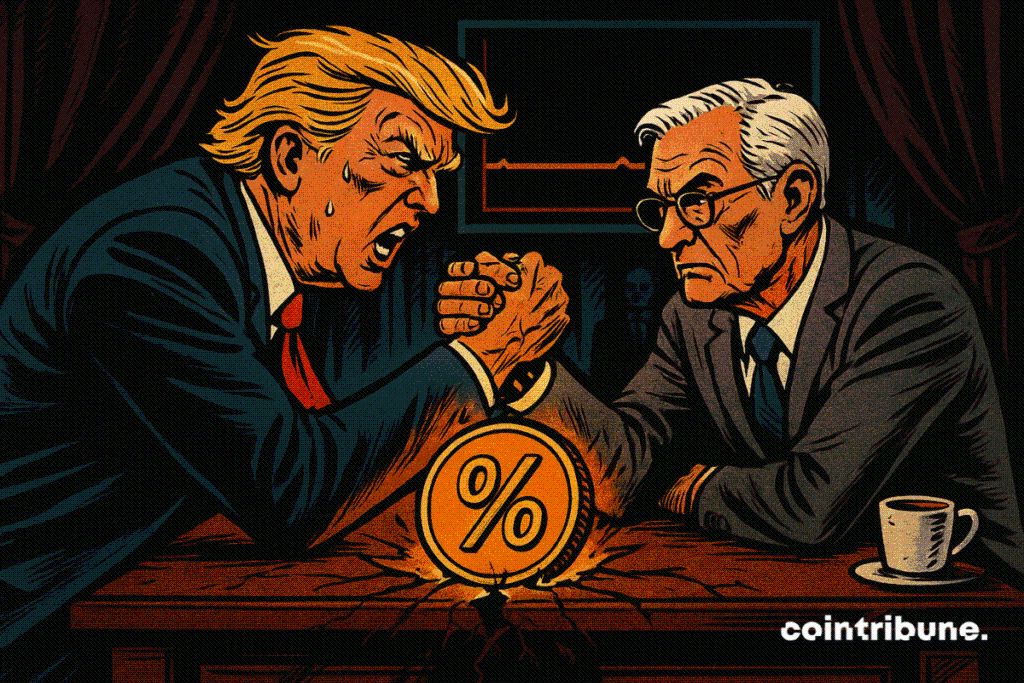Powell Defends Independence Amid Trump’s Attacks
The standoff between Donald Trump and the Federal Reserve is intensifying. The president accuses the institution of sabotaging the economic recovery by refusing to lower interest rates quickly. Ahead of a decisive meeting and amid growing trade tensions, the Fed is under heavy fire. In an increasingly politicized environment, the central bank’s independence is being tested as markets scrutinize its every signal while the U.S. economic trajectory remains uncertain.

In brief
- Donald Trump is ramping up his criticism of the Federal Reserve, accusing it of harming U.S. growth.
- The Fed has maintained its key interest rate within the 4.25% to 4.5% range for the fifth consecutive meeting.
- Jerome Powell justifies this decision by pointing to weak half-year growth and inflation still above target.
- The Fed firmly defends its independence against political pressure, emphasizing that its decisions remain data-driven.
The Fed Stays Firm Despite Mixed Signals
As tensions rise between Trump and Powell , on Wednesday, July 30, the Federal Reserve confirmed the maintenance of its key interest rate between 4.25 % and 4.5 %, extending its monetary pause for the fifth consecutive time.
This decision was justified by what the institution describes as an uncertain economic environment. “The economy is in a solid position despite persistent uncertainties,” said Fed Chair Jerome Powell during his press conference. He also noted that “the labor market is generally balanced and consistent with full employment,” while admitting that inflation remains “elevated compared to the long-term 2 % target.”
The Fed’s arguments are based on a series of economic findings it considers short-term concerns:
- Sluggish economic growth : although Q2 GDP rose by +3 % annually, Powell emphasized that due to a -0.5 % contraction in Q1, the total H1 growth is only +1.2 % ;
- Inflation still above target : despite a decline from 2022 peaks, inflation remains above the Fed’s 2 % goal ;
- Uncertain impact of tariffs : the effects of new tariffs are beginning to be felt in consumer prices, though Powell deems it premature to draw conclusions ;
- Internal dissent within the FOMC : governors Michelle Bowman and Christopher Waller voted for a 25-basis-point cut—marking the first double dissent since 1993.
The Fed remains vigilant, awaiting two more data releases on employment and inflation before its next meeting on September 16–17.
Markets immediately adjusted their expectations. According to the CME FedWatch Tool, the probability of a rate cut in September dropped from 63.3 % to 47.3 % , reflecting growing caution.
Trump Calls for Rates “Below 1 %” and Targets Powell Personally
Just hours after the Fed’s decision, Trump escalated his criticism. “Jerome Too Late Powell strikes again! He’s TOO LATE, and really TOO ANGRY, TOO STUPID, and TOO POLITICAL to serve as Fed Chair,” Trump wrote on Truth Social.
“Rates should already be well below 1 %,” he declared, asserting that the current rate levels hurt U.S. growth—growth he attributes to his economic reforms.
Although Trump appointed Powell in 2017, he now openly criticizes his actions, claiming the Fed is acting “against the interests of the American people.” His public campaign is putting unprecedented political pressure on an institution traditionally known for its independence.
Trump’s ties with FOMC members who supported the rate cut raise concerns about the future of that independence.
Powell responded firmly: “Having an independent central bank is an institutional arrangement that has served the public well and should be respected.” He added that Fed decisions are based “on data, evolving risks, not political considerations.”
Yet behind the scenes, analysts fear this growing confrontation could undermine the Fed’s credibility. Such pressure might “jeopardize U.S. monetary independence in the long run.”
This standoff between the Fed and Donald Trump could have systemic consequences. A weakened or politically manipulated Fed risks losing market trust. In a fragile monetary normalization context and amid simmering trade tensions, this could heighten volatility, including in the crypto markets. If the Fed bows to political pressure, it could temporarily boost risk assets, but destabilize inflation expectations.